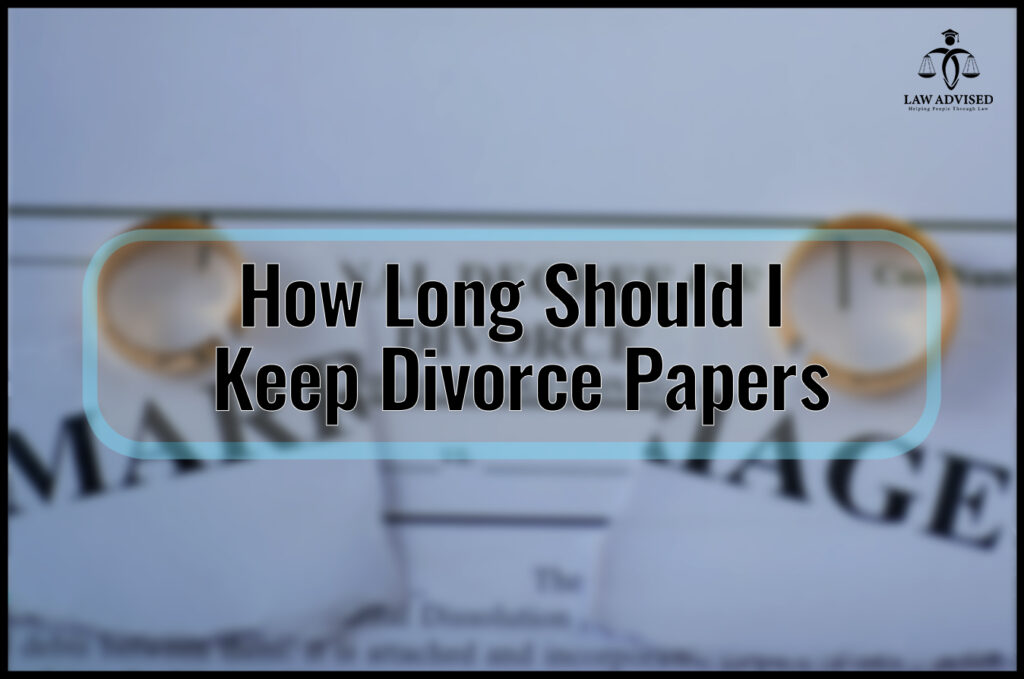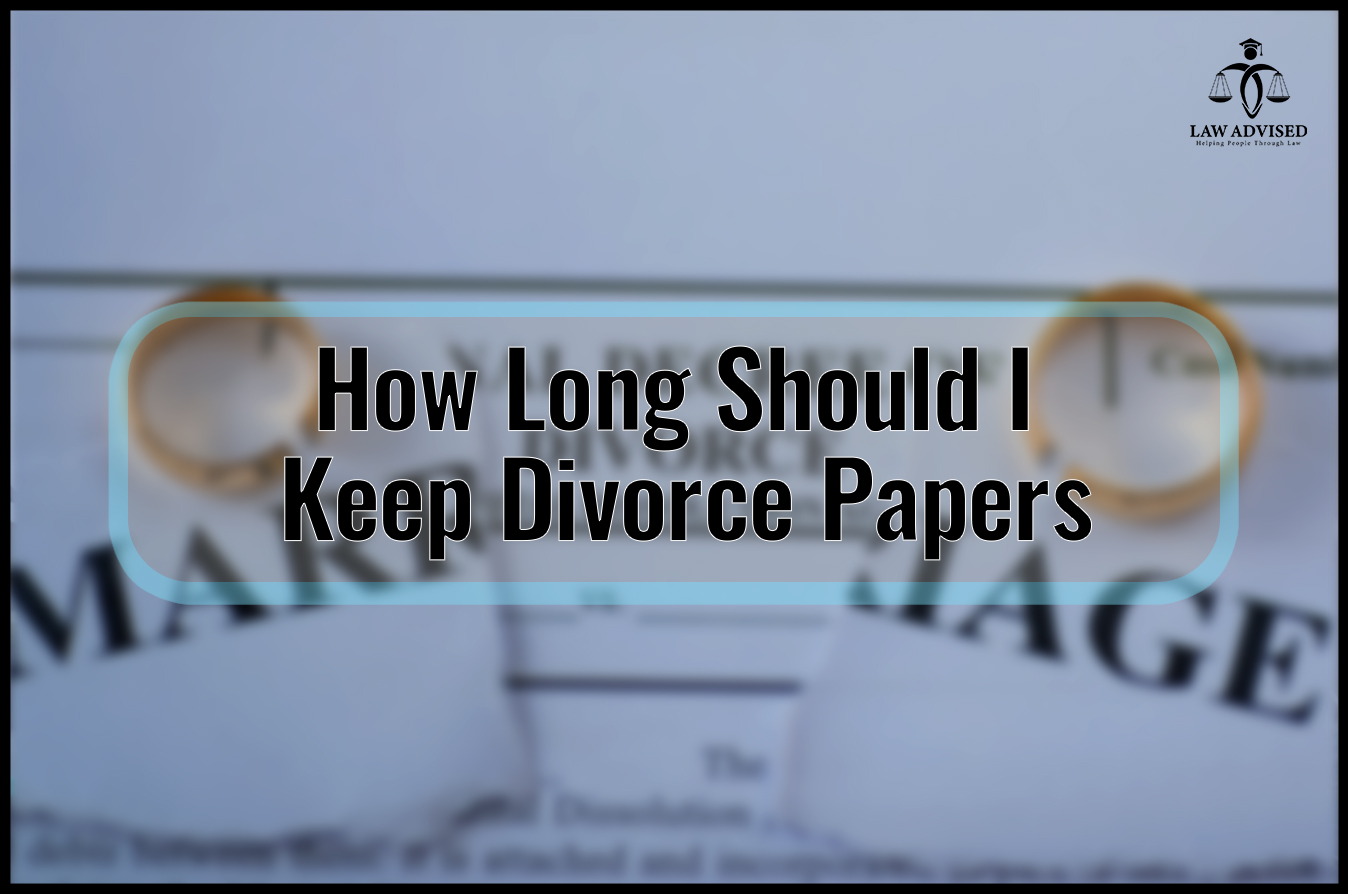Keep divorce papers for a minimum of 10 years for legal and financial purposes. Divorce papers are important documents that should be kept for a certain period of time after the divorce is finalized.
This is necessary because they provide legal proof of the dissolution of the marriage and may be required for various reasons in the future. In addition to legal matters, divorce papers can also be important from a financial perspective, as they may be needed for tax purposes, property division, or child custody issues.
Therefore, it is recommended to retain these papers for at least 10 years to ensure that you have easy access to them if needed. This article will further discuss the reasons why you should keep divorce papers and provide some tips on how to organize and store them effectively.
The Importance Of Keeping Divorce Papers
Divorce papers hold immense legal significance and should be kept for a specified period of time. These documents serve as proof of the dissolution of a marriage and contain critical information such as the date of divorce, division of assets and liabilities, child custody arrangements, and alimony details.
One of the key reasons for preserving divorce papers is to ensure legal compliance. These records act as legal protection in case disputes or conflicts arise regarding financial matters, child custody, or any other post-divorce issues. They provide concrete evidence that can be presented in court if necessary, allowing individuals to support their claims and protect their rights.
Moreover, keeping divorce papers accessible is crucial for administrative purposes. Various institutions and organizations may require these documents for official reasons such as changing one’s name, updating financial records, or obtaining government benefits.
It is recommended to store divorce papers in a safe and secure location, as they are sensitive and personal. Maintaining a physical or digital copy, alongside supporting relevant documents and correspondence, can help individuals navigate legal matters effectively and efficiently whenever the need arises.
Documents To Keep After Divorce
Divorce papers are important legal documents that should be kept for a specific period of time. There are different types of divorce papers that you should be aware of. These may include summons and complaints, marital settlement agreements, child custody and support agreements, and property division agreements. It is crucial to retain these documents as they provide a record of your divorce proceedings and may be required for future reference.
In addition to the divorce papers, there are other identification and financial records that you should keep after divorce. These include your driver’s license, social security card, birth certificate, passport, bank statements, tax returns, mortgage documents, insurance policies, and investment statements. Retaining these records will help facilitate any legal or financial matters that may arise after the divorce.
| Types of Documents | Examples |
|---|---|
| Divorce Papers | Summons and Complaint, Marital Settlement Agreements, Child Custody and Support Agreements, Property Division Agreements |
| Identification and Financial Records | Driver’s License, Social Security Card, Birth Certificate, Passport, Bank Statements, Tax Returns, Mortgage Documents, Insurance Policies, Investment Statements |

Factors To Consider In Determining Safekeeping Duration
When determining how long to keep divorce papers, it is important to take into account legal requirements and recommendations. Every jurisdiction has different regulations regarding the length of time divorce papers should be retained. While some states specify a minimum safekeeping duration, others may not provide a specific guideline. Furthermore, personal circumstances can also influence the duration of safekeeping. Factors such as ongoing legal proceedings, unresolved financial matters, or potential child custody disputes may necessitate keeping the divorce papers for a longer period of time.
An equally important consideration is the impact of children and future financial decisions. In cases involving children, it may be prudent to keep divorce papers until they reach adulthood. This ensures access to relevant information for matters such as child support, visitation rights, and potential modification requests. Moreover, retaining the papers can benefit future financial decisions, such as property division or alimony modification.
Recommended Safekeeping Duration For Divorce Papers
Divorce papers are important legal documents that should be kept for a specified period of time. The recommended safekeeping duration varies according to guidelines provided by legal experts. These guidelines take into account unique circumstances and aim to balance practicality and legal protection.
Legal experts suggest keeping divorce papers for a minimum of 3 to 7 years after the divorce is finalized. This duration ensures that you have access to the necessary documents during this crucial time. During this period, it is important to keep the papers in a safe and secure location. You may consider using a filing cabinet or a fireproof box for storage.
If you have children, it is often advised to keep the divorce papers until they reach adulthood. This ensures that you have all the necessary documentation related to child custody, support, and visitation rights. Additionally, if you are involved in any ongoing legal matters related to the divorce, it is recommended to keep the papers until the case is fully resolved.
Remember, keeping divorce papers beyond the recommended safekeeping duration may lead to unnecessary clutter and the risk of misplacing important documents. Therefore, it is essential to review your specific circumstances and consult with legal professionals to determine the appropriate duration for retaining your divorce papers.
Organizing And Storing Divorce Papers
Organizing and storing divorce papers is an important part of managing legal documents. There are several effective methods to ensure that your divorce papers are organized and easily accessible when needed.
One option is to use a filing system to organize your divorce papers. Create labeled folders or binders for different categories such as court documents, financial records, and custody agreements. Within each category, arrange the papers chronologically to maintain a clear timeline of events.
Another storage option is to digitize your divorce papers. Scanning the documents and saving them as PDF files allows for easy electronic access. Consider using cloud storage services or external hard drives to securely store electronic copies.
Digitization and cloud storage have become increasingly popular alternatives to physical paper storage. They offer benefits such as space-saving, easy searchability, and the ability to access documents from anywhere with an internet connection.
| Organizing Tips | Storage Options |
|---|---|
| – Create labeled folders or binders | – Physical filing system |
| – Arrange papers chronologically | – Digitization and cloud storage |
| – Use clear categories | – Scanning and saving as PDF files |
Choosing the right method for organizing and storing your divorce papers depends on personal preference and the amount of space available. Consider your future needs and the longevity of the documents when deciding on a storage solution.
What To Do If Divorce Papers Are Lost Or Destroyed
If you find yourself in a situation where your divorce papers have been misplaced, it’s important to take immediate action. The first step is to obtain certified copies of your divorce documents. Contact your local courthouse or the office where your divorce was filed to request these copies. Be prepared to provide necessary information such as your name, your ex-spouse’s name, and the date of your divorce. Once you have obtained the certified copies, make sure to keep them in a safe place.
Losing or destroying your divorce papers can have legal implications. It’s crucial to consult with an attorney, who can guide you on what necessary actions need to be taken. They can help you understand the potential consequences and provide guidance on how to proceed. In some cases, you may need to file a motion with the court to officially replace the lost or destroyed divorce papers.
Disposing Of Divorce Papers
Proper disposal methods for no-longer-needed divorce papers
When it comes to keeping divorce papers, it’s crucial to know how long you should retain them. Legal professionals recommend holding onto these documents for a certain period. For example, if there are child custody or support arrangements in place, it might be wise to keep the divorce papers as long as the agreements are in effect. It is also essential to consider the statute of limitations for any potential legal actions related to the divorce.
Once the time frame has passed, proper disposal of these papers is necessary to protect your data and privacy. Some secure disposal options include shredding the papers yourself or using professional document destruction services. When disposing of divorce-related documents, it is crucial to handle them with care to safeguard personal information and sensitive details from falling into the wrong hands.
Seeking Professional Advice
When it comes to deciding how long to keep your divorce papers, consulting with an attorney or legal professional is essential. They will help you navigate through the process and understand the state-specific requirements.
Understanding state-specific requirements
Each state has its own guidelines for retaining divorce papers. Some states require you to keep them indefinitely, while others have a set time frame, typically ranging from three to ten years. It is crucial to know the regulations in your state to ensure compliance.
Making informed decisions regarding divorce papers
Keeping divorce papers can be beneficial for various reasons. They serve as proof of dissolution of marriage, may be required for legal matters in the future, and can provide a record of financial agreements, child custody arrangements, and property settlements. Reviewing your situation and consulting with a professional will help you make the right decision on how long to keep your divorce papers.
Frequently Asked Questions Of How Long Should I Keep Divorce Papers
How Long Should I Keep Divorce Papers?
There is no specific time limit, but it is advisable to keep them indefinitely for legal and personal reasons.
Why Is It Important To Keep Divorce Papers?
Keeping divorce papers is important for legal documentation, tax purposes, property division, and future reference.
What Happens If I Don’t Keep My Divorce Papers?
Not keeping divorce papers may pose problems in the future, such as difficulties in proving divorce or obtaining financial benefits.
Can I Lose Access To My Divorce Papers?
Yes, it’s possible to lose access to divorce papers due to physical loss, damage, or misplacement. It’s important to store them securely.
How Should I Store My Divorce Papers?
Store divorce papers in a secure place like a safe deposit box, fireproof safe, or a digitally encrypted cloud storage platform.
Can I Get Copies Of My Divorce Papers If I Lose Them?
Yes, you can obtain copies of your divorce papers by contacting the court where the divorce was finalized and following their specific procedures.
Can I Dispose Of My Divorce Papers Once I Remarry?
No, it is still advisable to keep divorce papers even if you remarry, as they may still be required for various legal purposes in the future.
Do I Need To Keep Physical Or Digital Copies Of Divorce Papers?
Both physical and digital copies of divorce papers are acceptable. However, it is important to keep them securely in a manner that works best for you.
Conclusion
After going through the above information, it is clear that there is no definite answer to how long you should keep divorce papers. It ultimately depends on your personal situation and the legal requirements in your jurisdiction. However, it is generally recommended to retain these documents for at least several years.
Keeping them in a safe place ensures you have access to important information if needed in the future. Remember to check with your attorney or legal advisor for specific guidelines or recommendations.
Ismail Hossain is the founder of Law Advised. He is an Divorce, Separation, marriage lawyer. Follow him.





Leave a Reply